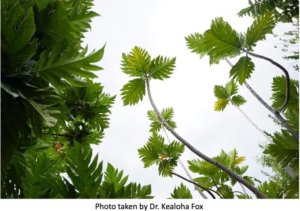To Remain or Retreat? A Consideration of Climate Migration in Hawai’i
Bella Pucker is a student at Middlebury College graduating this February and Dr. Kealoha Fox is a Senior Advisor to the Institute for Climate and Peace, Climate Commissioner at the American Academy of Arts & Sciences, and a Climate for Health Ambassador.
Climate change is boundary-less, extending even to ourselves and our bodies. Polluted air and water can make us sick, hurricanes and wildfires can paralyze us, and changing environmental conditions can threaten generations-old kinship to land. Each of these injuries is damaging in its own way, yet the psychological dimension of climate change is often overlooked since it is less immediately visible.
We have spent the past year researching the social and psychological factors that motivate decision-making in the context of climate change in the Hawaiian Islands. Our research has focused specifically on the factors that underlie coastal residents’ decisions to consider relocation as an adaptive strategy to climate change. This summer, I, Bella, had the privilege of speaking directly with residents of Hawaiʻi. As I sat at home in Massachusetts connecting over Zoom with individuals halfway across the globe, I was able to viscerally grasp the reality that climate change is a universal phenomenon. While I listened to interviewees’ tales of trauma and despair associated with the climate impacts in the Pacific, I personally experienced the hurricanes that ravaged the East Coast of the United States, and saw media coverage of the wildfires that devastated the West. These concurrent catastrophes helped me to more fully appreciate the far-reaching, unforgiving nature of the current crisis we have wrought on the planet. Yet the stories of community resilience and belonging offered comfort against this backdrop of alarm.
While climate change is a global issue, each place experiences its impacts differently and is worthy of inquiry. People are bonded to place. This connection is epitomized by the term “place attachment.” Place-specific research conducted within an archipelago reveals that this is particularly true in a place like Hawaiʻi. Here, the remote nature of the islands paired with Native Hawaiian Traditional Ecological Knowledge (TEK) inspires a deep and layered understanding of the natural landscape in the Pacific. The isolation of the islands demands self-reliance, which has given rise to intricate and involved knowledge systems of the islands and their physical landscape. Moreover, Hawaiian TEK is centered around the understanding that people and the environment are interconnected in reciprocal relationships. A framework of kinship is used to illustrate the inseparability between humans and the natural world.


While place attachment is, by definition, a dynamic bond (since places and people are constantly evolving), climate change poses a major threat to this connection. Islands in the Pacific Ocean are one of the first regions worldwide to contend with sea level rise and coastal flooding. The impacts of rising seas will be felt in many ways, ranging from saltwater intrusion, to increased erosion, to changing fish migratory patterns, and to damaged infrastructure. Other threats such as wildfires, extreme heat, and drought are also very real for inhabitants of the Hawaiian Islands. These changing environmental conditions will force residents of Hawaiʻi to reposition their identities in relation to the land.
The findings of my research indicate a positive correlation between place attachment and risk perception: residents of Hawaiʻi are deeply connected to their place and are therefore also highly attuned to the risks posed to their environment and community. Their intricate understanding of the environment translates to an almost innate recognition of the changes that the land is undergoing. This, in turn, leads residents of Hawaiʻi to support adaptive measures to combat climate change and ensure that their community and way of life remains intact. However, adaptation that requires relocation–climate migration–was not considered as a viable option for these residents. These residents are connected to their home communities in such a way that relocation seemed inconceivable.
Conversations about these local-level decisions are increasingly taking place on an international scale. The 26th United Nations Conference of Parties (COP) is currently taking place. This annual conference marks the opportunity for international leaders to discuss plans to address climate change. While plenaries focused on climate migration, energy industry subsidies, and carbon reduction commitments are occurring at a high-level, it is vital to also ensure that the voices of the individuals most impacted by the climate emergency are heard.
Beyond just discussion of the geophysical and geopolitical repercussions of migration, the psychological dimensions that underpin climate change decision-making must also guide policy and action. Drawing attention to the nonphysical aspects of the climate crisis is essential to assure that coastal residents, especially those on islands, remain strong and resilient to battle decades of pending challenges.
References
McMillen, H. L., Ticktin, T., Friedlander, A., Jupiter, S. D., Thaman, R., Campbell, J., Veitayaki, J., Giambelluca, T., Nihmei, S., Rupeni, E., Apis-Overhoff, L., Aalbersberg, W., & Orcherton, D. F. (2014). Small islands, valuable insights: Systems of customary resource use and resilience to climate change in the Pacific. Ecology and Society, 19(4). https://www.jstor.org/stable/26269694
Bonaiuto, M., Alves, S., De Dominicis, S., & Petruccelli, I. (2016). Place attachment and natural hazard risk: Research review and agenda. Journal of Environmental Psychology, 48, 33–53. https://doi.org/10.1016/j.jenvp.2016.07.007
Bella Pucker is a student at Middlebury College graduating this February. She is an Environmental Studies major with a focus in Psychology (Conservation Psychology) and is excited to pursue a career at the intersection of these two fields.
Dr. Kealoha Fox is a Senior Advisor to the Institute for Climate and Peace and Climate Commissioner at the American Academy of Arts & Sciences. Kealoha was named an Obama Foundation Leader: Asia-Pacific in 2019. She is also a Climate for Health Ambassador an author, professor, and Kanaka Maoli scientist from Hawaiʻi. Connect with her about health, climate, peace, and indigenous rights on Twitter and LinkedIn.
For more information on climate change impacts to mental health, check out the 2021 edition of Mental Health and Our Changing Climate from ecoAmerica and the American Physiological Association.